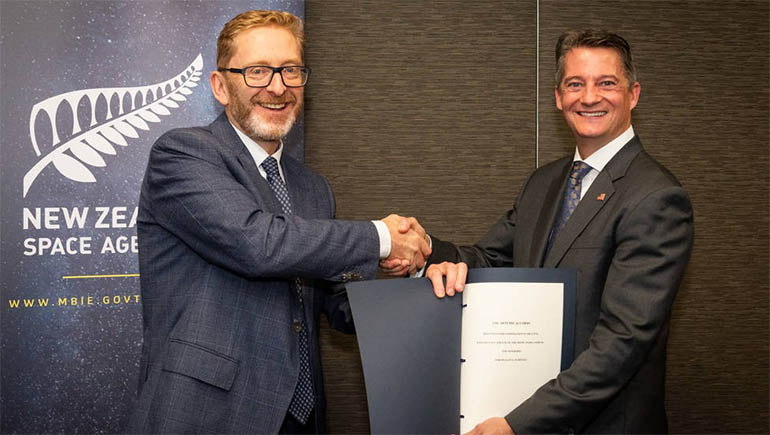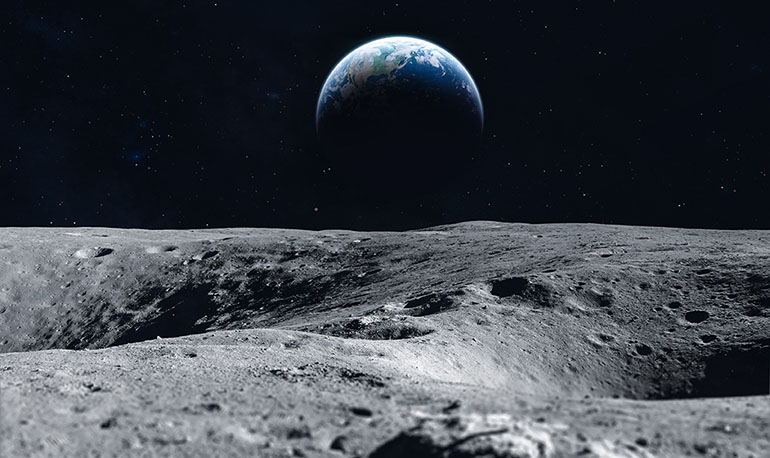Promoting the responsible uses of space internationally
Space activity has long relied on countries working together due to the cost and complexity of travelling to, and working in, outer space.
On this page
New Zealand is one of the few countries that has space launch capability. This gives us a credible voice internationally, and a responsibility to actively preserve the benefits of space for future generations and other nations across the world.
New Zealand’s space sector is well placed to take advantage of the opportunities presented by launch activity, including attracting innovative technologies, engaging in space exploration, and helping to mitigate global challenges such as climate change.
Objectives
The New Zealand government promotes the responsible uses of space internationally. This means:
- Advocating for effective international rules, norms and standards in space
- Partnering with like-minded launch states to adopt peaceful, responsible and sustainable space practices
- Collaborating internationally to increase New Zealand’s influence and capabilities in the global space sector
Advocating for effective international rules, norms and standards
New Zealand is party to the main international agreements that promote a safe, responsible, sustainable and peaceful space environment.[21] We reflect these international laws and governance arrangements in our domestic legislation and policies.
The key international space forum where New Zealand advocates for effective rules, norms and standards in space is the United Nations Conference on the Peaceful Uses of Outer Space (COPUOS). This conference is responsible for developing rules and norms about how civilians use outer space safely and sustainably. New Zealand joined COPUOS in 2017. Since then, we have been involved in negotiating guidelines on the long-term sustainability of outer space activities[22] and setting up the working group that will implement the guidelines.
Most international laws on space activities were developed in the 1960s. Since then, the global space landscape has vastly changed, including through the rise of commercial organisations in space, when it was previously dominated by government programmes from a few large nations.
As a result, gaps exist in the international regulatory framework, and New Zealand advocates for additional rules, norms and standards where these exist. This includes seeking agreement to ensure over-arching obligations (including that space activities are for peaceful purposes, in the interest of maintaining international peace and security, and for the benefit and interest of all countries).
We are pursuing developing norms and principles as the most pragmatic way forward.[23] To that end, New Zealand has been a strong supporter of the UK-led resolution on developing norms and principles of responsible behaviours in outer space. New Zealand is actively participating in the resulting open-ended working group at the United Nations, with the objective of developing common understandings of what responsible behaviour in outer space looks like in practice.
Partnering with like-minded launch states to adopt peaceful, responsible and sustainable space practices
Every country has an interest in ensuring the orbital space around Earth is accessible and sustainable. This includes ensuring satellites can safely function and spacecraft can safely transit through orbital space. Sometimes, the risks to space assets are outside anyone’s control, particularly with regard to space weather. Risks are also not obvious or predictable.
Some behaviours which can threaten the continued sustainability of near-Earth space include placing weapons in space, anti-satellite (ASAT) missile testing, and developing ground or orbital systems that cause intentional interference with satellites or their operations. Other activities, while not inherently irresponsible, can lead to heightened risks of interference, increased debris, and the limitation of resources such as desirable orbital positions.
Engaging with other like-minded launch states on common values, and with all satellite owners/operators on these values, is essential to safeguard space as a peaceful, responsible and sustainable domain. New Zealand’s bilateral space and security partnerships also provide broader domestic benefits to our national security and international relations.
Modelling responsible space behaviours
In 2021, New Zealand submitted ideas to the U.N. General Assembly on the further development and implementation of norms, rules and principles of responsible behaviours and on the reduction of the risks of misunderstanding and miscalculations with respect to outer space.
These responsible behaviours are examples of mitigating some of the aforementioned challenges and New Zealand’s efforts in modelling these.
Mitigating creation of space debris
States have a responsibility to not intentionally or knowingly create or support the creation of debris. If space becomes less accessible, emerging space countries could face severe difficulties in using it effectively and this is not equitable or in line with our commitments to the Outer Space Treaty.
Supporting the development of international law
New Zealand seeks to employ the full range of tools available to us. This means engaging through multilateral forums at the United Nations bodies, as well as engaging with smaller groupings where we see opportunities to influence the future rules. Our participation in the Artemis Accords is an example.
Transparency & communication
Space actors are encouraged to communicate their intention prior to engaging in an activity, to create predictability, opportunities for feedback or risk notification, and more effective management of risks. Regarding applications to conduct space activities from New Zealand, MBIE regularly releases information about every payload permitted.
Space situational awareness
Includes the ability to incorporate data from a variety of sources to enhance understanding of the location and behaviour of objects in Earth’s orbit and ensure that all stakeholders have a more complete picture of the operating environment. MBIE actively tracks and monitors space objects launched from New Zealand.
Collaborating internationally to increase New Zealand’s influence and capabilities in the global space sector
New Zealand is also committed to working with all countries that explore space. We see this as an opportunity for scientists, researchers and other New Zealanders to join international efforts to learn about our solar system, galaxy, and the universe, and to share knowledge from space exploration endeavours for the benefit of humankind.
New Zealand’s contributions to space exploration can also advance technology solutions or science in areas of national importance, including climate change resilience and natural disaster recovery, particularly in the Pacific, and our sustained scientific investigations of Antarctica.
Artemis Accords
In May 2021, New Zealand signed the Artemis Accords[24] with the United States. We are one of 19 signatories to date representing a diverse group of countries.[25] The Accords set principles for the peaceful exploration of space, transparency, interoperability, release of scientific data, safe and sustainable use of resources, safe disposal of debris, and prevention of harmful interference in others’ activities among other principles.

Dr. Peter Crabtree, former Head of the New Zealand Space Agency and former Chargé d'affaires of the U.S. to New Zealand Kevin Covert, following New Zealand signing the Artemis Accords on May 31, 2021.
Many celestial bodies contain rare, valuable minerals. Extracting these resources is likely to play a role in the exploration of deep space. Some commercial companies are also interested in extracting them and bringing them back to Earth. It is difficult to estimate the potential economic value from accessing space. However, a 2018 study commissioned by the Luxembourg Space Agency expects the space resource utilisation (SRU) industry will generate up to €170 billion between 2018 and 2045.
New Zealand does not currently intend to extract space resources. New Zealand’s position is that the basic level of regulation provided by existing international law is not sufficient to regulate SRU in the long term. Therefore, New Zealand advocates for multilateral rules, norms, or standards in order to ensure the long-term sustainability of SRU, reinforce the peaceful use of outer space, and effectively implement the existing international rules on SRU. Before we take part in any SRU activity, we will also make sure to meaningfully consult on our position with New Zealanders.
New Zealand’s launch capability has provided a new strand to the development of our diplomatic and economic relationships, in turn supporting our security objectives. While launch capabilities are increasingly in the private sector, governments continue to make up a large proportion of the customer base for launch providers. These payloads can range from research and development, to operational civil services, to military and intelligence payloads. As a trusted partner, launch providers operating from New Zealand are well placed to provide this service.
All payloads, including those owned by foreign governments, must meet the tests required under New Zealand’s regulations and New Zealand’s international obligations. Provided prospective payloads meet this test, it is not only a valuable source of business for New Zealand-based firms, but creates high paying jobs for New Zealanders and facilitates research partnerships with New Zealand institutions. New Zealand’s status as a responsible launch nation also amplifies our voice in international settings, where we advocate for the peaceful, responsible, and sustainable use of space to safeguard benefits for all countries and future generations.

[21] These agreements include the Treaty on Principles Governing the Activities of States in the Exploration and Use of Outer Space, including the Moon and Other Celestial Bodies (also known as the Outer Space Treaty), agreed in 1967; the Agreement on the Rescue of Astronauts, the Return of Astronauts and the Return of Objects Launched into Outer Space (also known as the Rescue Agreement), agreed in 1969; and the Convention on International Liability for Damage Caused by Space Objects (also known as the Liability Convention), agreed in 1974. In 2018, New Zealand acceded to the Convention on the Registration of Objects Launched into Outer Space (the Registration Convention), in time for the first launch of spacecraft from New Zealand.
[22] See Guidelines for the Long-term Sustainability of Outer Space Activities [PDF 403 KB](external link) — United Nations: Office for Outer Space Affairs
[23] New Zealand Ministry of Foreign Affairs and Trade. (2021). Norms, rules and principles of responsible behaviours in space: New Zealand contribution [PDF 638 KB](external link) — United Nations
[24]NASA. (14 October 2020). NASA, international partners advance cooperation with first signings of Artemis Accords(external link) — NASA
[25] The other 18 signatories are Australia, Bahrain, Brazil, Canada, Colombia, Israel, Italy, Japan, Luxembourg, Mexico, Poland, the Republic of Korea, Romania, Singapore, Ukraine, the United Arab Emirates, the UK and the US.
< Regulating to ensure space activities are safe and secure | Modelling sustainable space and Earth environments >



